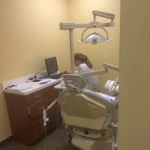1. What Is Dental Anxiety and Its Effects?
Dental anxiety refers to the fear, stress, or apprehension some people feel before or during dental visits. It can range from mild nervousness to severe phobia that leads to avoiding dental care altogether. This fear affects an estimated 15% of the U.S. population, often resulting in delayed treatment and worsening oral health conditions.
The consequences extend beyond oral health—poor dental hygiene linked to anxiety can impact overall wellness, causing pain, infections, and social discomfort. Understanding dental anxiety's profound effects highlights the importance of finding effective treatment options to ensure regular, stress-free dental visits.
2. Common Causes of Dental Anxiety
Several factors contribute to dental anxiety, including past traumatic dental experiences, fear of pain, loss of control, and the intimidating sounds and smells of a dental office. Additionally, some people experience anxiety linked to general fears or other mental health conditions.
Identifying the root cause of dental anxiety helps tailor treatments and coping strategies. For example, someone fearful due to previous painful procedures might benefit more from sedation options, while others may respond well to psychological support or gradual exposure techniques.
3. Can Dental Anxiety Be Treated? Overview
The good news is dental anxiety can indeed be treated through a combination of psychological methods, behavioral techniques, and medical interventions. Many patients successfully overcome their fear and enjoy comfortable dental experiences.
Effective treatment focuses on reducing fear triggers, building trust with the dental provider, and employing relaxation techniques. Treatment plans are personalized, considering the severity of anxiety and individual patient needs.
At Dentistry Toothtruth, patients find compassionate care that integrates these approaches to manage and treat dental anxiety successfully.
4. Psychological Approaches to Manage Dental Anxiety
Cognitive-behavioral therapy (CBT) is one of the most effective psychological treatments for dental anxiety. CBT helps patients challenge and change negative thoughts about dental visits, replacing them with positive coping mechanisms.
Other methods include systematic desensitization, where patients gradually face dental-related situations in a controlled way, and mindfulness practices to reduce stress. Support groups and counseling also provide emotional support.
These therapies empower patients to regain control, making dental care approachable rather than frightening.
5. Sedation and Medical Interventions
For moderate to severe dental anxiety, sedation dentistry offers medical relief. Options range from mild sedation, such as nitrous oxide (laughing gas), to oral sedatives and intravenous sedation.
Sedation helps patients relax, reduces pain perception, and allows dentists to perform procedures efficiently. It is safe when administered by trained professionals and often combined with psychological strategies for best results.
Discussing sedation options with your dentist can help tailor treatments to your comfort level and medical history.
6. Tips for Patients to Reduce Dental Anxiety
Patients can take practical steps to reduce dental anxiety before and during visits. These include communicating openly with the dentist about fears, practicing deep breathing or meditation, listening to calming music, and scheduling shorter appointments.
Bringing a trusted friend or using distraction techniques also helps ease anxiety. Preparing mentally and physically for the appointment creates a sense of control and reduces fear.
Combining these tips with professional treatment provides a comprehensive path toward anxiety-free dental care.
Finding Support and Expert Care at Dentistry Toothtruth
If you’re wondering, “Can dental anxiety be treated?” know that help is available. Dentistry Toothtruth offers expert guidance, compassionate care, and advanced treatment options to help you overcome dental fears and maintain optimal oral health.
Taking the first step to address dental anxiety can transform your experience and improve your overall quality of life. Reach out to trusted dental professionals who understand your concerns and can tailor a treatment plan just for you.







 Andrew Morris, DDS5.0 (16 review)
Andrew Morris, DDS5.0 (16 review) Dr. Daniel S. Fife, DDS4.0 (31 review)
Dr. Daniel S. Fife, DDS4.0 (31 review) Superior Smiles3.0 (23 review)
Superior Smiles3.0 (23 review) Root Cause Dentistry- Biological Dentist0.0 (0 review)
Root Cause Dentistry- Biological Dentist0.0 (0 review) Downtown Dental Center4.0 (114 review)
Downtown Dental Center4.0 (114 review) Distinctive Smiles of Dublin4.0 (399 review)
Distinctive Smiles of Dublin4.0 (399 review) The Importance of Oral Health Education During Pregnancy for a Healthy Pregnancy
The Importance of Oral Health Education During Pregnancy for a Healthy Pregnancy Best Tips for Brushing Your Teeth Properly for Healthy Gums: Essential Techniques for Oral Health
Best Tips for Brushing Your Teeth Properly for Healthy Gums: Essential Techniques for Oral Health Why Skipping Dental Checkups Can Lead to Bigger Oral Health Problems
Why Skipping Dental Checkups Can Lead to Bigger Oral Health Problems Advantages of Porcelain Dental Restorations
Advantages of Porcelain Dental Restorations How Can Diabetes Cause Tooth and Gum Problems? Preventing and Managing Oral Health Issues
How Can Diabetes Cause Tooth and Gum Problems? Preventing and Managing Oral Health Issues Healthy Habits for Promoting Good Oral Health and Hygiene: Tips for a Healthy Smile
Healthy Habits for Promoting Good Oral Health and Hygiene: Tips for a Healthy Smile